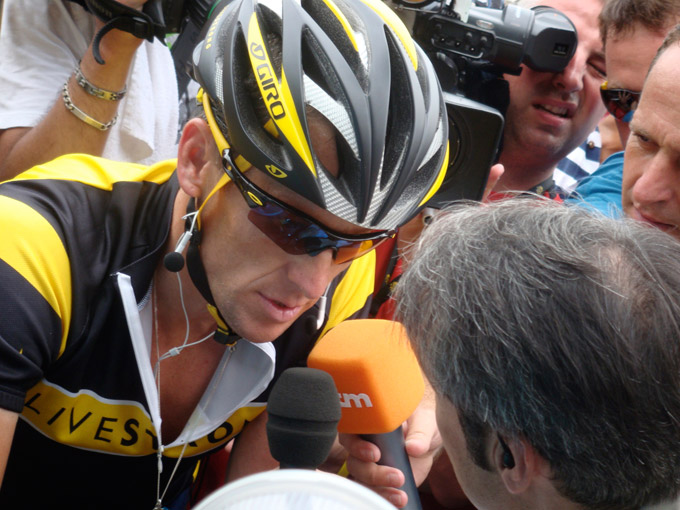
The last few years have seen sport of all kinds haunted by the specter of doping, with everyone from Barry Bonds to Alex Rodriguez linked to the use of banned substances. But the name that is likely to forever be linked with drugs cheating in sports is Lance Armstrong. Thanks to his seven victories at the Tour De France, the cyclist would have been a hero even if he hadn’t also recovered from a near-death battle with cancer, and subsequently raising millions and millions of dollar for research against the disease thanks to his Livestrong brand.
But since the mid-1990s, Armstrong has faced accusations that he used banned substances and, more recently, blood transfusions to achieve his extraordinary success. He always denied it vociferously. For a long time, a lack of evidence kept his name clean, but in the last few years, the net tightened and testimony by former teammates saw him stripped of his victories and banned from life from all sports in 2012. And Oscar-winning documentarian Alex Gibney had a front row seat to much of this.

The “Taxi To The Dark Side” and “Mea Maxima Culpa” helmer had initially set out to make a film about Armstrong in 2009, when the cyclist came out of retirement to try and win an eighth Tour De France title. The film seemingly stalled, but when Armstrong’s cheating was finally exposed, Gibney reconnected with his subject, filming new interviews with him and with others after Armstrong finally made his confession in an interview with Oprah Winfrey earlier this year. The result is a fascinating study of a complex and controversial figure, but one that, due to the staggered nature of its production, isn’t quite as satisfying as you might hope.
If you’re familiar with Gibney’s earlier work, the solid quality of “The Armstrong Lie” won’t surprise you. The editing is razor-sharp, the propulsive score, by David Kahne, keeps the pace and tension rollicking along, and the filmmaker knows how to ask the right questions, while still maintaining an appropriate distance to his subject. Armstrong’s flaws become more than apparent on screen—his giant ego, his arrogance, his near-obsessive fear of losing.
But he’s not demonized either, cutting a sad and curiously sympathetic figure, even while he could still be lying to those around him, and to himself (he still denies cheating during his 2009 comeback, but there are plenty of suspicions to the contrary). There’s no doubt that he perpetrated one of the great sporting frauds, but he’s allowed to make his case—that everyone else was using the same techniques, he just lied about them for longer—without the film becoming an apologia. Indeed, if Gibney feels angry and betrayed at Armstrong, and he is, he’s most critical of the rotten core of the cycling world that allowed the abuses to happen.

On a scene-by-scene basis, it’s terrific stuff, but it doesn’t quite come together as a whole. To begin with, the structure of the film feels rather choppy, and while it soon settles down, it becomes clear why. Gibney essentially shot a whole film, then entitled “The Way Back,” focusing less on the cheating allegations and more on the 2009 comeback attempt. Why the film was never completed isn’t entirely clear—there are suggestions that it’s because he didn’t get the ending he wanted—but the director only finished up early this year.
And the joins show: it’s often clear that he’s essentially pasted one movie in-between scenes from another, and the result is both uneven, and rather over-extended, with the two hour runtime feeling a little fatty in places. To use a recent parallel, Kathryn Bigelow and Mark Boal essentially threw out the earlier version of what became “Zero Dark Thirty” after Bin Laden’s death and started again, but here, Gibney seems too attached to the film he originally set out to make.
It’s also worth noting that there aren’t really any major revelations here. If you followed the scandal closely over the years, it’ll likely feel like going over old ground. But for all its flaws, the film offers as compelling and fair a summary of the case and the man for those less well-versed in the tale as you could ask for from a documentary. [B-]
Browse through all of our coverage of the 2013 Venice Film Festival to date by clicking here. Check out a clip from the documentary below, plus check out some new photos too.




